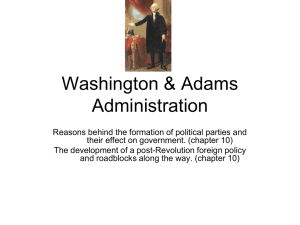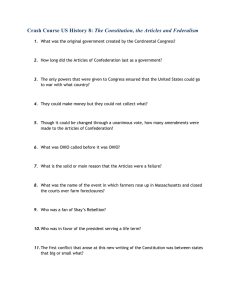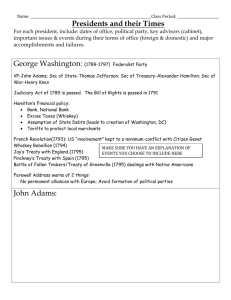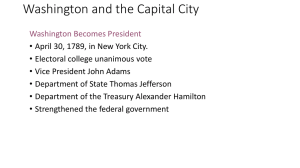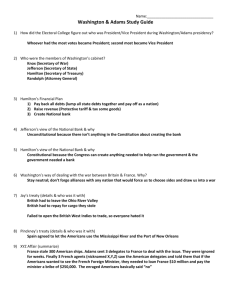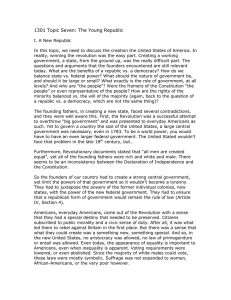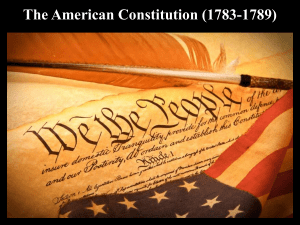1301.Topic Seven.doc
advertisement
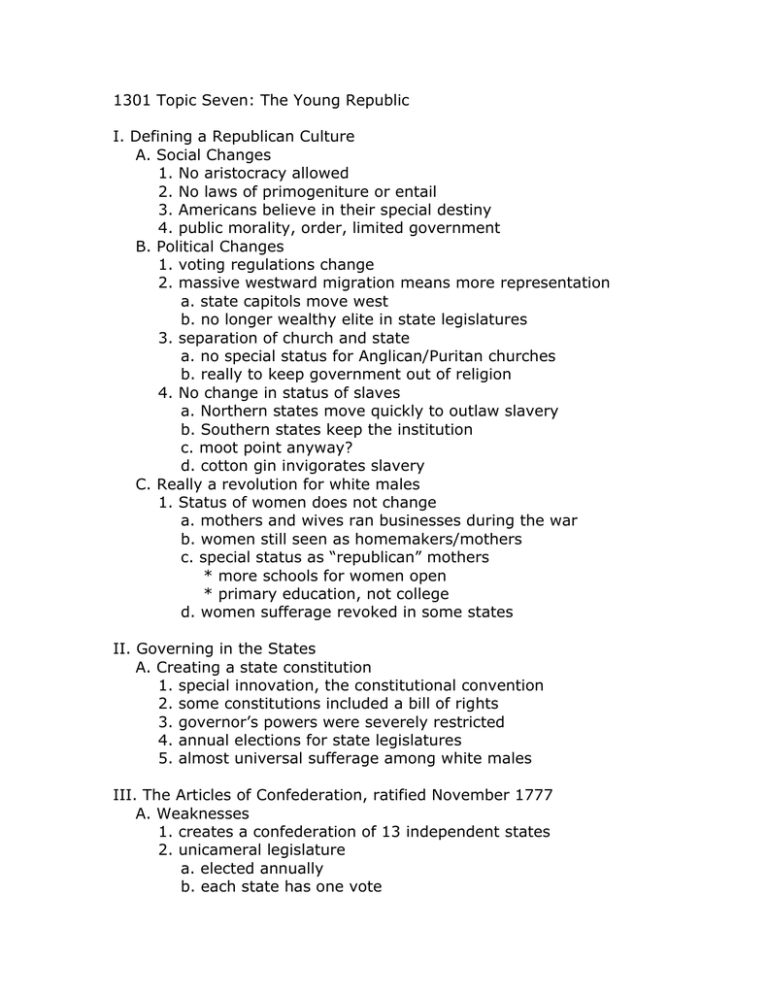
1301 Topic Seven: The Young Republic I. Defining a Republican Culture A. Social Changes 1. No aristocracy allowed 2. No laws of primogeniture or entail 3. Americans believe in their special destiny 4. public morality, order, limited government B. Political Changes 1. voting regulations change 2. massive westward migration means more representation a. state capitols move west b. no longer wealthy elite in state legislatures 3. separation of church and state a. no special status for Anglican/Puritan churches b. really to keep government out of religion 4. No change in status of slaves a. Northern states move quickly to outlaw slavery b. Southern states keep the institution c. moot point anyway? d. cotton gin invigorates slavery C. Really a revolution for white males 1. Status of women does not change a. mothers and wives ran businesses during the war b. women still seen as homemakers/mothers c. special status as “republican” mothers * more schools for women open * primary education, not college d. women sufferage revoked in some states II. Governing in the States A. Creating a state constitution 1. special innovation, the constitutional convention 2. some constitutions included a bill of rights 3. governor’s powers were severely restricted 4. annual elections for state legislatures 5. almost universal sufferage among white males III. The Articles of Confederation, ratified November 1777 A. Weaknesses 1. creates a confederation of 13 independent states 2. unicameral legislature a. elected annually b. each state has one vote c. unanimous approval for amendments d. no power to tax e. no power to make economic decisions 3. No executive office holder a. no power of veto B. Strengths 1. Settling the western territories a. States give their claim to the west to the natl. govt. b. Land Ordinance of 1785 c. Land Ordinance of 1787 * process by which territories become states * new states will not be colonies but equal members C. Failure of the Articles of Confederation 1. Economic a. hugely in debt b. could not regulate the economy c. could not force states to pay debts d. Newburgh Conspiracy 2. Foreign Policy a. British still in Northwest Territory b. Spain closes Mississippi River/New Orleans IV. From the Articles of Confederation to the Constitution A. Several major crises pushed opinion towards reform 1. economic woes 2. Shay’s Rebellion B. Philadelphia Convention, May 1787 1. decide to start from scratch 2. Virginia Plan 3. New Jersey Plan 4. Connecticut Compromise or “the Great Compromise” 5. needs only 9 states approval for ratification C. Ratification 1. Much opposition to the Constitution 2. Bill of Rights added by James Madison 3. New Hampshire becomes 9th state to ratify, June 1788 4. Elections for Congress and President are held 5. George Washington elected as first president V. The First Administration A. George Washington unanimously elected 1. created strong, independent presidency 2. not a figurehead 3. everyone has to figure out how this will work 4. Vice President is John Adams 5. Congress creates the executive departments a. Dept. of War, Henry Knox b. Dept. of the Treasury, Alexander Hamilton c. Dept. of State, Thomas Jefferson d. Attorney General, Edmund Randolph 6. Judiciary Act of 1787 creates federal court system a. judges appointed b. serve for life c. Supreme Court, John Jay 1st Chief Justice d. 12 District Courts and 3 Circuit Courts 7. Tariff of 1789 passed B. Hamilton’s National Agenda 1. represented northern, mercantile, urban interests 2. wanted strong central government 3. willing to “bend” the constitution 4. economic ties to Britain 5. development of American industry 6. use wealthy to promote growth C. Jefferson’s Agrarian Vision 1. represented southern, agricultural, rural interests 2. believed federal power needed to be contained 3. strict interpretation of the constitution 4. wants close ties to France 5. agriculture would create a nation of “yeoman” farmers 6. universal education would help farmers shape democracy D. Creating a National Debt 1. Funding and Assumption a. passes Congress b. compromise between Madison and Hamilton 2. Bank of the U.S. a. Doctrine of Implied Powers b. approved by congress 3. Report on Manufacturing a. attacked by Jefferson on moral grounds b. U.S. will remain an agricultural nation (for now) E. Foreign Policy and the two party system 1. French Revolution starts in 1789 a. several phases, including the Reign of Terror 1793-94 b. revolution ends with Napoleon coming to power 1799 c. for 25 years, Europe at war 2. Led to formation of two political parties a. Federalists, led by Alexander Hamilton b. Democratic Republicans, led by Thomas Jefferson 3. Washington issues Proclamation of Neutrality a. British seize American ships b. Jay’s Treaty signed c. Congress threatens impeachment of Washington 4. Treaty of Greenville a. Natives leave NW Territory 5. Treaty of San Lorenzo a. Spain opens up New Orleans to American traffic F. Washington retires from the presidency 1. Legend of Cincinnatus 2. Farewell Address a. isolationism b. no political parties 3. John Adams elected as 2nd president VI. The Administration of John Adams A. Handicapped from the beginning 1. VP is Thomas Jefferson, leader of the opposing party 2. doesn’t get along with Hamilton, leader of his own party 3. has to keep Washington’s cabinet for political purposes B. Foreign Policy also a problem 1. French react to Jay’s Treaty by seizing American ships 2. XYZ Affair a. Talleyrand demands huge bribes from the Americans b. seen as an insult to the U.S. 3. The “Quasi-War” a. pseudo war against the French b. Congress establishes the Dept. of the Navy c. Adams’ refused to ask for declaration of war d. threatened to resign e. Alien and Sedition Acts passed instead 4. Jefferson and Madison respond a. wrote the Virginia-Kentucky Resolves b. pure political propaganda but c. will become part of the states’ rights argument 5. Adams’ re-opens negotiations with the French a. Napoleon has come to power b. Treaty of Mortefontaine ends the “Quasi-War” c. probably cost Adams’ re-election in 1800 C. Election of 1800 1. results in a tie between Jefferson and Aaron Burr 2. Jefferson wins the election 3. Never trusts Burr again D. Judiciary Act of 1801 1. expanded the federal court system 2. was a needed reform 3. Adams worked to fill the new benches before he leaves office a. known as the “Midnight Appointments” b. based on legend, not fact

